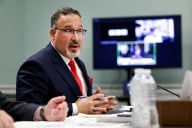You have /5 articles left.
Sign up for a free account or log in.
 The Splendid and the Vile: A Saga of Churchill, Family, and Defiance During the Blitz by Erik Larson
The Splendid and the Vile: A Saga of Churchill, Family, and Defiance During the Blitz by Erik Larson
Published in February of 2020
I've been recommending The Splendid and the Vile as a book to help us all make it through COVID-19. If the British could make it through 57 nights of continuous German bombing of London (starting on September 7 of 1940), then surely we can persevere through this pandemic. The Splendid and the Vile might be one of those books that I recommend that needs no recommendation. Likely, you have heard about Larsen's latest book. If you've heard from colleagues and friends that the book is fantastic, then you have good colleagues and friends.
What might a university president or provost learn from reading The Splendid and the Vile during this pandemic? How might the book help in thinking about calibrating our response to COVID-19? What would Churchill do if he found himself running a university in 2020?
1 - Don't Sugarcoat - Speak Plainly and Honestly:
Much of The Splendid and the Vile consists of listening to Churchill in his own words. What we learn from Churchill's various speeches and addresses is that he never minimized the threat, and never shrunk from describing the reality. This willingness to be honest with the British people gave him credibility when he laid out a plan to mobilize forces to defeat the Nazis.
Larsen quotes from Churchill's June 4, 1940 "The Finest Hour" speech to the House of Commons:
Nevertheless, our thankfulness at the escape of our Army and so many men, whose loved ones have passed through an agonizing week, must not blind us to the fact that what has happened in France and Belgium is a colossal military disaster. The French Army has been weakened, the Belgian Army has been lost, a large part of those fortified lines upon which so much faith had been reposed is gone, many valuable mining districts and factories have passed into the enemy's possession, the whole of the Channel ports are in his hands, with all the tragic consequences that follow from that, and we must expect another blow to be struck almost immediately at us or at France. We are told that Herr Hitler has a plan for invading the British Isles.
When university leaders fail to speak about the public health realities of the pandemic, they lose credibility when relating to strategies to restart campus operations.
2 - Lay Out a Positive Vision for the Future:
Quoting from the same Finest Hour speech, Churchill thundered:
Even though large tracts of Europe and many old and famous States have fallen or may fall into the grip of the Gestapo and all the odious apparatus of Nazi rule, we shall not flag or fail. We shall go on to the end, we shall fight in France, we shall fight on the seas and oceans, we shall fight with growing confidence and growing strength in the air, we shall defend our Island, whatever the cost may be, we shall fight on the beaches, we shall fight on the landing grounds, we shall fight in the fields and in the streets, we shall fight in the hills; we shall never surrender.
This speech shows that it is possible to both be clear-eyed about the reality of the situation and to layout an absolute commitment to do whatever it takes to prevail. At this point, I think all of us in higher ed could use some combination of reality and vision.
3 - Surround Yourself With Advisors Who Will Disagree With You:
One of the joys of The Splendid and the Vile is learning about the idiosyncratic cast of misfits that Churchill surrounds himself. These characters include Churchill's science advisor, Frederick "The Prof" Lindemann, and his Minister of Aircraft Production, Lord Max Beaverbrook. These advisors, and others, were often contentious and disagreeable, but they were also willing to disagree with the Prime Minister.
During the pandemic, the hope is that university leaders are getting advice from those whose jobs don't directly depend on their standing in the campus organizational bureaucracy. Casting a wide net for university misfits, those not vested in retaining the incumbent structures and traditions of their institutions may be precisely what higher education leaders need in charting a course out of the pandemic.
4 - Get Help:
A large portion of The Splendid and the Vile is take up by Churchill's attempts to gain American support for the War effort. Churchill embarked on a focused and sustained effort to build a partnership with FDR. The result was the Lend-Lease agreement, a policy that supplied the UK and the Allies with billions of dollars worth of food, fuel, and weapons.
We are likely in a place where higher education will not be able to respond to the challenges of COVID-19 alone. Our public colleges and universities, particularly our community colleges, will need substantial public support. Higher education leaders from all types of institutions - including wealthy privates - should be devoting significant energies to advocating for state and federal support for public institutions.
5 - Don't Be Afraid to Show Emotion:
One aspect of Churchill's leadership that surprised me while reading The Splendid and the Vile was the extent to which Churchill showed his emotions. He seems to have been unafraid to shed tears in public. To get angry and to express grief, when the moment demanded.
A willingness of our university leaders to publicly express the range of emotions about the pandemic's impact on all of our lives may be similarly effective. Churchill seems to have always been authentic during the Blitz, ever faithful to who he was. That confidence seems to have helped the British people survive the unimaginable stress of constant bombing and threat of invasion.
There is, of course, much else that I could write about The Splendid and the Vile. Larsen builds his history by weaving together private diaries, public records, and the events of the first years of the War. If you've read Larsen before, you know that his nonfiction books read like novels. Indeed, Larsen never claims that he is writing history, or filling in the role of a historian. Instead, The Splendid the Vile is a marvelously told story - one that happens to be true.
What lessons might you think to apply from Churchill's leadership during the War to our present-day challenges?
What are you reading?








